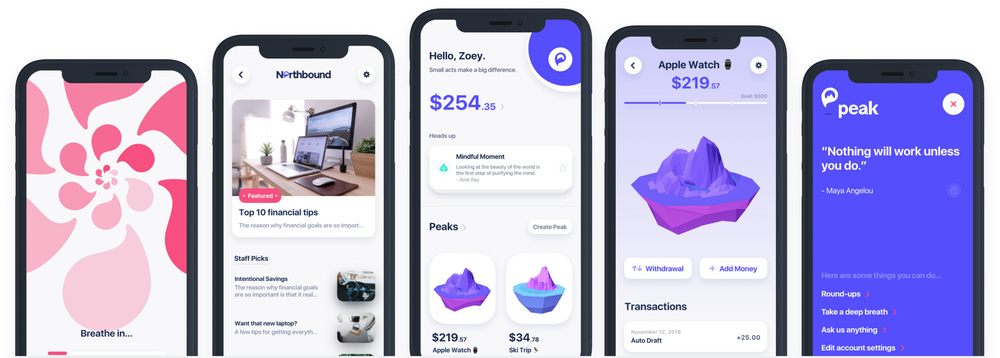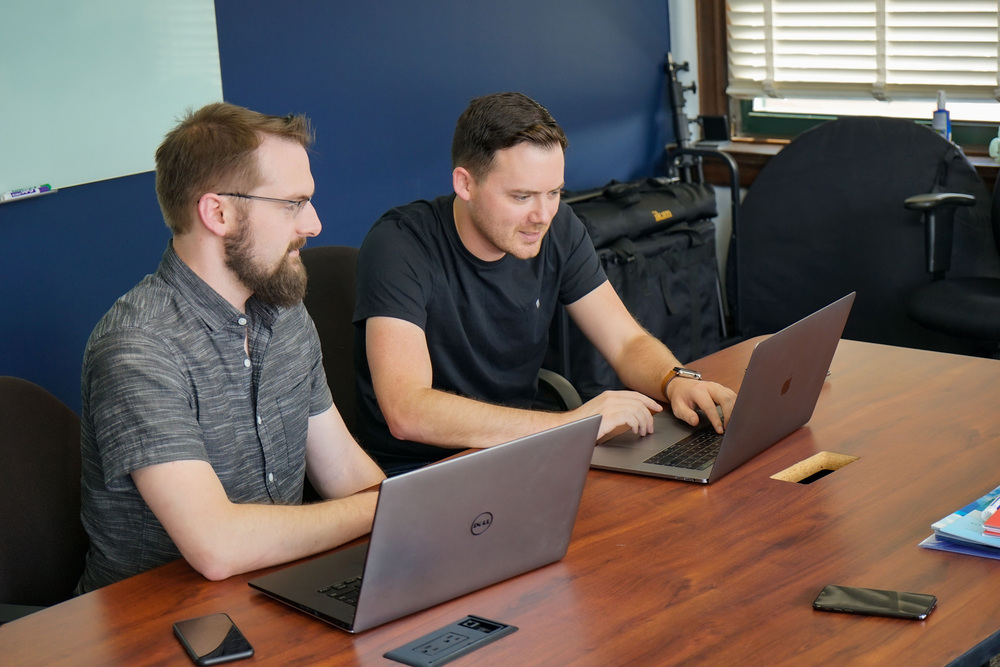Saving money is a balance between what’s best for your future and the needs, desires, and whims of your present. Building a good relationship with your finances is like any other healthy habit—it’s about improving your behavior in small ways to make big changes. And just like training for a race or trying to eat better, saving money becomes a lot easier if you have clear goals and a good system to keep you on track. This is where Peak Money comes in. The app uses principles from the world of health and wellness to help people reach their savings goals. And the software introducing people to these principles comes from a team with years of experience building technology designed to challenge or change our most ingrained behaviors.
The Peak Money team is lean but powerful. They’ve worked together for almost a decade, developing products that help users set clear goals, evaluate progress, and gain encouragement and accountability along the way. As they set out to spread healthy financial habits, Peak Money chose GitHub Team to collaborate, connect to the open source community, and work fast across team roles and time zones.
Like many apps, Peak Money started with people, an idea, and some code. For the engineers, the question wasn’t “Should we use GitHub?” but “How should we use GitHub?” They’d been using the platform to develop software for about five years—but as their new app launched and the team grew, they realized they needed to create a shared workspace for the whole team, beyond just engineering. In 2018, they decided the first step to a better, more transparent process was getting everyone on GitHub Team.

“Engineering was a black box,” explained Jonathan Yagel, VP of Marketing. “We would see the product but not the process.” Now, GitHub has evolved into Peak Money’s go-to cross-functional platform and the basis of everyone’s asynchronous communication, alongside tools like Slack. “Even as marketers or designers, we wanted to meet developers where they work all of the time and follow along as they build. With everyone in one place, we can all work faster—everybody’s there.”
This started with the full team following product discussions on GitHub—everyone had full context, without needing cumbersome status updates or separate timeline reports. Next, the Peak team expanded GitHub use even further: repositories were created to track marketing campaigns, growth experiments, and even operational projects, as the team sought to standardize their processes and communications systems across business functions. “Initially, I couldn’t see how GitHub could work for projects that have nothing to do with code,” said Yagel. “But the platform’s conversational structure is so flexible that we were quickly able to replace our other project management tools, to keep everyone up to speed on things like our marketing timeline and the results of the latest acquisition initiative. I love using the wiki feature for standardizing copy and milestones to cluster Issues around a certain topic or timeline.”
The need for this kind of team-wide collaboration became even more pressing after a critical shift: the team decided to go fully remote after years of making a home in Chattanooga, Tennessee. “In part because of GitHub,” said Yagel, “We realized that having a single, central office wasn’t necessary if we had a single, central platform to coordinate projects.” As a result, Peak Money employees can work however they work best while expanding their talent pool. “Some people are more productive in the morning–and some love working late at night. Having a forum where we can all find each other and track work asynchronously has been revolutionary for us.”

Head of Engineering Lee Adkins believes that providing a central place for software development—from ideation to production—has helped all teams share goals and priorities. To keep everyone on the same page even when they’re sprinting through work, the team sticks to the rule that all big product decisions go into GitHub. “Pulling everyone together in one place to share, debate, and discuss ideas is something we’ve never done before,” he explained. “That’s the biggest impact GitHub has had on our business. As a team, we’re way more confident that we’re in tune. We can all see our work, feedback, and roadmap going through GitHub.”
Using GitHub also brings the team closer to the open source projects they all depend on. Peak Money’s backend runs off of Elixir and they deploy all of their code through Kubernetes. “All of these projects and people are on GitHub—from our dashboards, we can star and watch open source projects, right where we work,” said Adkins. “Having it all in one place is so easy.” And with so many examples from the open source community, developers can see how maintainers manage large projects across contributors and time zones—useful best practices for an increasingly remote culture.”
We almost take for granted what we get from our GitHub Team account for the price we pay for it. It’s the perfect fit for our small team—and as the system grows, we get the same level of quality and security as we’d expect from any GitHub product.
With a small but growing team, Adkins finds it much more economical to find and build on best-in-class software development tools, rather than recreating their own systems. “GitHub was kind of a no brainer,” he explained. “We almost take for granted what we get from our GitHub Team account for the price we pay for it. It’s the perfect fit for our small team—and as the system grows, we get the same level of quality and security as we’d expect from any GitHub product.”
Although the team considered setting up their own servers, they ultimately decided it wasn’t worth the investment in time and effort. With GitHub Team, “We have all this functionality that we don’t have to worry about maintaining,” he said. “Being able to use GitHub to run our infrastructure and just own the code, the project management, and the documentation—it takes a big burden off of our operations department.”
Adkins sees integrating applications in the cloud as a way to lower administrative time and focus on more important things, like developing their product. The team uses the GitHub API to integrate with other applications they use, automate pull requests, open support requests, power their CI process, and more. As heavy Google Cloud users, the Peak Money team integrates GitHub with the Google Cloud build app, hooking the two together for status updates as builds complete. They also wire in Firebase and other applications that automate bug reporting and issue creation.

Adkins also appreciates the relative ease of administering a GitHub Team account. “You buy seats, send an invite out to a new employee, and they’re all set up. We can monitor two-factor authentication and audit logs to see permissions, and we can add users to a specific team to get the exact access they need to our repositories.” Adding and organizing teams into functional hierarchies also makes it easier to bring in groups like marketing without sorting through individual users.
As the system scales, so does the Peak Money development team. And GitHub has become an important part of growing both the company’s process and its people. Developers often use GitHub for personal projects—and the transition from hacking on hobbies to working on company software has been an easy one. “GitHub is an invaluable resource for us as a place to learn, collaborate, and contribute to the broader community. It’s kind of a common language. Everyone is familiar with it,” he explained.
The world of startups changes fast, but looking to the future, Adkins is confident their setup will provide the features they need to evolve and adapt as a company. “GitHub’s reputation of being a stable source helps us make sure we can maintain access to our code in ways we couldn’t if we were hosting it ourselves,” he said. “And GitHub seems to be growing and improving at such an accelerated rate that, in my mind, anything we can think of is possible—or already happening.”



